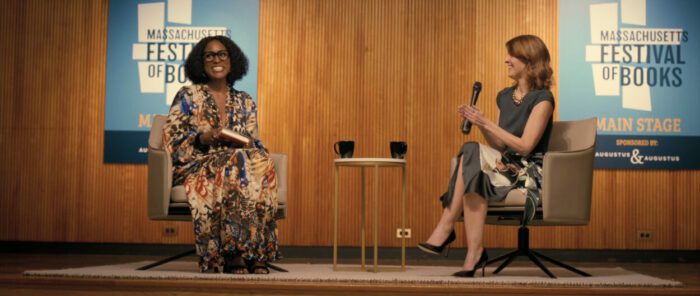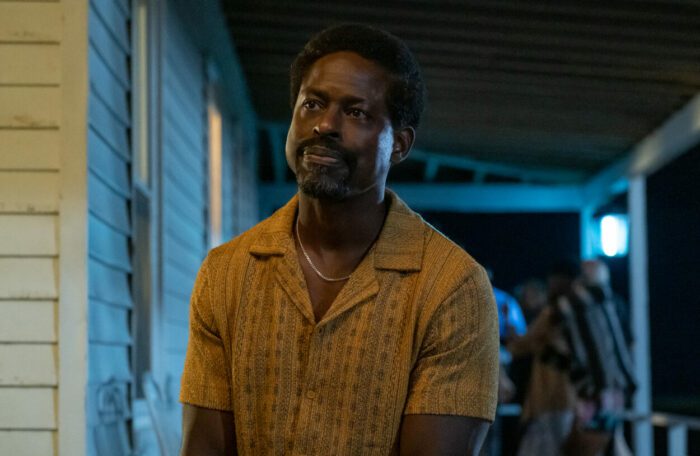Right off the bat, the screenplay of Cord Jefferson and the acting of Jeffrey Wright let audiences know the defining mindset and the type of man Thelonious Ellison is going to be in American Fiction. The professor has written a book title with a dry erase marker behind him that includes the N-word. Nearly immediately, a white female Gen Z student raises her hand in protest. Ellison, a Black male in his 50s, chooses direct clarity to say:
“You’re going to encounter some archaic thoughts and coarse language. We’re all adults. I think we can understand it in the context of the language.”
Coming from a fellow educator writing this review, it’s a perfect response as a teacher and professional. It’s clear, considerate, and celebrates the assumed intelligence and maturity of the audience. The young lady is undeterred as if every word of his response was invalid. Then comes the first gritted sigh of frustration of many that will follow from Thelonious.
More tersely and representing his race, he adds, “If I can get over it, so can you.” We don’t see the immediate response from the student to that retort, but we can imagine. American Fiction waits a beat and changes location to the hallway outside the classroom where the female student is leaving in a tearful huff while we hear the loud echo of Ellison asking if anyone else has a problem with the choice of class reading.

This warranted frustration defines the main character of American Fiction. Nicknamed “Monk” after the jazz artist, Thelonious Ellison is a proud intellectual, not unlike fellow awards season Best Actor contender Paul Giamatti’s character in The Holdovers. We can tell from this first scene and in the next scene showing the professor defending his behavior without remorse to his superiors that Thelonious has gone to great lengths to be a learned and distinguished author and teacher far above the average lot in life beset to his minority demographic. Moreover, he has reached an age of experience where he both flaunts and never leaves that perceived high road above the ever-present racist puddles that pool in his work and personal life.
With this introduction, Jeffrey Wright unpacks one of the most fascinating lead characters of the year, whose peccadillos trigger both entertaining measures of comedy and drama. Circling back to that pulled quote from above, much of what follows in American Fiction—adapted from Percival Everett’s novel Erasure by director Cord Jefferson in his feature film debut after an Emmy-winning TV career—lives up to its adult arena of analytical musings giving way to gruff vernacular from time to time, all in a way where anyone can understand and empathize with the layers of presented circumstances.
When his California-set school puts him on leave for his mini-fracas, Thelonious takes the time off as a chance to head east to his native Boston area home to participate in a literature conference and explore possibilities for his next book with the guidance of his agent Arthur (classic “That Guy” John Ortiz). While at the event, Thelonious encounters the star of the festival, namely fellow author Sintara Golden (The Photograph’s Issa Rae). She is hogging all spotlights with the chart-topping success of her new novel We’s Lives in the Ghetto, a graphic minority tale written in heavy African American Vernacular English (AAVE) that the more refined Ellison finds to be Black trauma porn pandering to undesirable Black stereotypes only uppity white audiences fall for. Say hello again to the frustrated intellectual watching this surging success when he can’t even get a sniff at another book deal, all to which Arthur can only warn “Don’t insult anyone important.”

On a lark of a personal challenge, Thelonious goes on a heater of a writing session (including excellent little “theater” visualizations of the enlivened characters acting out scenes in Ellison’s room) and pens My Pafology, a novel written in the same thug-heavy style of Golden’s book. Intended as a joke to make a point, he submits it under a pen name to Arthur for pitches. What was supposed to rub publishers’ and readers’ noses in the horseshit they solicit backfires profitably into a lucrative book deal leveraged by white absolution from exactly the privileged crowd Ellison despises.
This development leads to quite a few kickers in American Fiction. The first is that the book’s immediate success means more people—including a vain movie producer (a hilarious extended cameo from Adam Brody) heartset on the film rights—want to know more about the mysterious author. This ruse involves a former convict stereotype persona drummed up by Arthur and acted out begrudgingly by Thelonious. The second is that Ellison is invited to join an awards committee with Sintara Golden and others to determine the best new book of the year, and the field includes his new book written under his pseudonym.
The casting of Jeffrey Wright could not have been more perfect because of the history he represents. There is an entire generation of Wes Anderson cinephiles, James Bond afficionados, Hunger Games lovers, and The Batman fans who are not going to remember how the theatrically-cultivated Wright broke out in Hollywood playing the very stereotypes his Thelonious character hates. Seeing the man who played the titular street artist in Basquiat and, more hilariously, the maniacally over-the-top Peoples Hernandez villain in Shaft will relish this flip of a performance with a knowing squint and smile.

The final kicker is a little more extended, personal, and dysfunctional. Part of coming back to the Scituate community of Sand Hills and Peggotty beaches was dealing with unresolved family crises. Not long after returning, Thelonious’s younger sister Lisa (The High Note’s Tracee Ellis Ross) dies unexpectedly. Her loss leaves the long-widowed Ellison family matriarch Agnes (Leslie Uggams of the Deadpool series) without a stable financial caretaker, just as she is rapidly degrading to dementia. It becomes up to Monk and his younger, divorced, gay, and Arizona-based plastic surgeon brother Cliff (the scene-stealing This is Us Emmy winner Sterling K. Brown) to pick up the pieces, meaning the new paycheck from his trashy book comes in handy.
Without that blossoming back story rooted in misdeeds and sadness, Cord Jefferson’s film would strictly be a snappy satire on the book world, and damn good one at that. American Fiction tears into wrongly-placed obsessions with Black entertainment and the multitude of misused hyperbole for buzzword labels like “important” and “essential” when it comes to the semi-political harping for diversity and representation. Jefferson left room to respond to the proverbial “At what point does it go too far?” questions that arise for Thelonious and his extended lie, and the filmmaker is not afraid to show his hero to be on the wrong side of many stumps.
Yet, by adding and revealing the fraying family dynamics and a potential love interest in Erika Alexander’s lawyer neighbor Coraline, American Fiction adds rich depth to its main character and becomes a more abundant movie. A movie of all industry schemes might veer to the cockamamie. Likewise, a movie of all family drama would get encumbered by the shuffle of heaviness. With American Fiction, those emotions balance each other, and audiences get the best of both worlds with arguably the year’s best satire packaged within a tissue-pulling, affecting drama.



